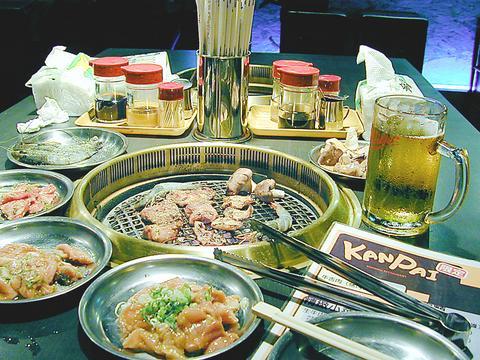If the only thing you can think about after dining out is taking a nap, you likely had a good meal. Leave it to a Japanese barbecue joint named after the Chinese term for "bottom's up" to put you in just such a state.
Walk in to Kan Pai and you're greeted with the most deafening irasshaimase! you'll ever care to hear. The staff are decked out like a formula one pit crew, the speakers are jamming J-pop (Yes, jamming. Who knew!?) and customers are emptying one glass after another while getting their arms tangled turning meat on the grill. If you came for a relaxing meal, you came to the wrong place. Kan Pai will wear you out.
Since you're at a sear-it-yourself barbecue place, the first thing you'll want to do is grease your griddle. Order a plate of tonbara (NT$120), thinly sliced pork, or its beef brethren, kalbi (NT$120), and a beer -- you're barbecuing after all. Every item on the menu has two listed prices; full price and half price. If you pay a NT$120 per-person entrance fee, you pay half price. That means the tonbara and kalbi you just ordered each cost NT$60 and the mug of beer cost only NT$55 (Yes, NT$55! Who knew!?) May as well order the tankard (NT$150) and keep your server busy toting plates of meal and veggies instead. You can also order a small glass of beer for just NT$5. The thing is, you'll need a beer for the toast.

PHOTO: DAVID MOMPHARD, TAIPEI TIMES
Every night just before 8pm the wait staff brings a round for anyone who needs it and asks if you're there celebrating anything special. On the hour, the whole joint raises a glass in unison, shouts a few "happy birthdays!" and "happy anniversaries!", then Kan Pai! If you weren't made deaf from the greeting at the door, you are now. Finish your glass in one drink and get another of the same for free. This place is dangerous.
It's made all the more dangerous by the Kiss Kalbi offer. For all couples of any age or sex willing to hold a kiss (while the whole restaurant counts backwards from 10 and someone snaps your photo) you'll receive one plate of the above-mentioned kalbi free of charge. Some poor guy on a first date tried to convince his red-faced companion that this would be a lot of fun, but got nowhere. Lucky for him the beer is cheap. He can go home and sleep it off like the rest of us.

June 2 to June 8 Taiwan’s woodcutters believe that if they see even one speck of red in their cooked rice, no matter how small, an accident is going to happen. Peng Chin-tian (彭錦田) swears that this has proven to be true at every stop during his decades-long career in the logging industry. Along with mining, timber harvesting was once considered the most dangerous profession in Taiwan. Not only were mishaps common during all stages of processing, it was difficult to transport the injured to get medical treatment. Many died during the arduous journey. Peng recounts some of his accidents in

What does the Taiwan People’s Party (TPP) in the Huang Kuo-chang (黃國昌) era stand for? What sets it apart from their allies, the Chinese Nationalist Party (KMT)? With some shifts in tone and emphasis, the KMT’s stances have not changed significantly since the late 2000s and the era of former president Ma Ying-jeou (馬英九). The Democratic Progressive Party’s (DPP) current platform formed in the mid-2010s under the guidance of Tsai Ing-wen (蔡英文), and current President William Lai (賴清德) campaigned on continuity. Though their ideological stances may be a bit stale, they have the advantage of being broadly understood by the voters.

Artifacts found at archeological sites in France and Spain along the Bay of Biscay shoreline show that humans have been crafting tools from whale bones since more than 20,000 years ago, illustrating anew the resourcefulness of prehistoric people. The tools, primarily hunting implements such as projectile points, were fashioned from the bones of at least five species of large whales, the researchers said. Bones from sperm whales were the most abundant, followed by fin whales, gray whales, right or bowhead whales — two species indistinguishable with the analytical method used in the study — and blue whales. With seafaring capabilities by humans

In a high-rise office building in Taipei’s government district, the primary agency for maintaining links to Thailand’s 108 Yunnan villages — which are home to a population of around 200,000 descendants of the Chinese Nationalist Party (KMT) armies stranded in Thailand following the Chinese Civil War — is the Overseas Community Affairs Council (OCAC). Established in China in 1926, the OCAC was born of a mandate to support Chinese education, culture and economic development in far flung Chinese diaspora communities, which, especially in southeast Asia, had underwritten the military insurgencies against the Qing Dynasty that led to the founding of